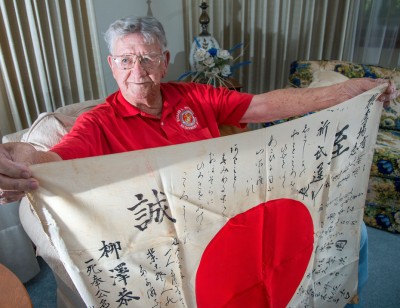Doug Robinson
By Paul Wood

Photo By Heather Coit/The News-Gazette
SIDNEY — Back when Jimmy Carter was president, Doug Robinson had newly enlisted in the Navy, and was on a ship 3 miles off the coast of Iran.
Beginning Nov. 4, 1979, Iranian revolutionaries seized 66 hostages, mostly diplomats and embassy employees; after a short period, some hostages were released, but 52 American diplomats and citizens — including local Marine Paul Lewis — were held hostage for 444 days. To say that nerves were on edge is an understatement.
Iranian PT boats armed with missiles approached Robinson’s cruiser, the USS Jouett. All the sailor could do was watch and hope.
“Under Carter’s rules of engagement, we couldn’t fire unless we were fired upon,” he says.
Robinson, 55, enlisted in the Navy at 18 and came through it fine, even working in the White House with Colin Powell and other top military leaders.
Recently, he’s become director at the Sidney Community Library, also serving as a consultant after a long career in government, sales and education.
Also new in his life: having a 7-year-old Cub Scout for a son long after becoming a grandfather.
Robinson says he lived in 17 places as an Air Force brat before he joined the Navy.
He alternated in his career between military and government, going on leave to work in the White House in top security jobs. His resume has several spots marked “classified.”
He does acknowledge serving in China and as a courier in North Korea as part of his clandestine career.
Even before he went back to Southern Illinois University-Carbondale for a bachelor’s degree in management and a master’s in education, Robinson served in leadership aboard the USS Carl Vinson, USS Oldendorf, USS Jouett and USS Brooke.
His government titles include working in the Department of Defense during the Reagan administration as the sea-service representative for personnel and security (the Navy, Marines and Coast Guard) and in other duties.
He met Ronald Reagan and remembers him as “incredibly personable” with a good rapport with everyone from top leaders to the White House gardener.
Robinson was acting deputy director of administration in George H.W. Bush’s White House, as well as chief of military personnel for the National Security Council, a protocol and dignitary escort officer, and a federal campaign coordinator.
At the National Security Council, he worked with Powell, the retired four-star general who became secretary of state.
Among the issues while he was Powell’s deputy was the Iran-Contra affair — dealing arms to Iran in hopes of securing the release of several U.S. hostages, as well as fund the Contras in Nicaragua. A few years later came the fall of communism and the Soviet Union.
“The Cold War was winding down. The Berlin Wall was coming down. How that ended was amazing, the suddenness of it,” Robinson says.
Do you know a veteran who could share a story about military service? Contact staff writer Paul Wood at pwood@news-gazette.com.
Read more stories from local veterans:
 Jim Kelly
URBANA — When Jim Kelly was in the Marines, he met John Wayne in a bar. The film star bought him a drink in Laguna Beach …
Jim Kelly
URBANA — When Jim Kelly was in the Marines, he met John Wayne in a bar. The film star bought him a drink in Laguna Beach …
 Matt Kreeb
GILMAN — Sgt. Matt Kreeb was eager to serve his country. The Iroquois West grad served in the prestigious and demanding …
Matt Kreeb
GILMAN — Sgt. Matt Kreeb was eager to serve his country. The Iroquois West grad served in the prestigious and demanding …
 Robert Alsop
CHAMPAIGN — At an outpost that could have been overrun any minute by the smallest of North Korean forces, Robert Alsop w …
Robert Alsop
CHAMPAIGN — At an outpost that could have been overrun any minute by the smallest of North Korean forces, Robert Alsop w …